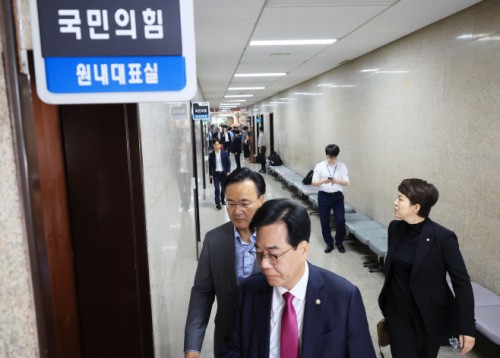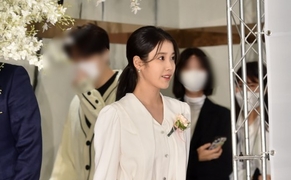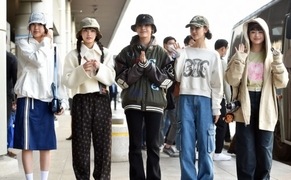 |
| Song Eon-seok, then floor leader of the People Power Party, enters the PPP floor leader’s office at the National Assembly in Seoul on September 2, as Special Counsel Cho Eun-seok’s team conducts a search over alleged obstruction of a vote to lift emergency martial law. / Source: Yonhap News |
The special counsel investigating alleged obstruction of a parliamentary vote to lift emergency martial law is considering asking a court to examine People Power Party (PPP) lawmakers as witnesses after several refused to appear voluntarily.
Special Counsel Deputy Park Ji-young said on September 8 the team had requested appearances and sought cooperation “through various channels” to establish the facts of the case, adding that it is “reviewing an application for witness examination under the Criminal Procedure Act.”
“If the court grants the request, witnesses who ignore summons may be brought in,” Park said, urging lawmakers to appear voluntarily before any filing. “We ask for their cooperation to uncover the truth.”
Article 221-2 of the Criminal Procedure Act allows a prosecutor, before the first trial date, to seek a judge’s examination of a person who refuses to appear or testify despite being deemed to possess facts essential to a criminal investigation. Because the applicant must show the person clearly knows the relevant facts, the provision is rarely used.
The special counsel is probing why 90 out of 108 PPP lawmakers failed to take part when the National Assembly voted in the early hours of December 4 to demand the termination of emergency martial law. Investigators are looking into reports that former President Yoon Suk-yeol spoke by phone for about one minute with then-PPP floor leader Chu Kyung-ho, after which Chu repeatedly changed the location of an emergency caucus meeting, allegedly preventing many lawmakers from joining the vote.
Prosecutors sought to question PPP lawmakers as reference witnesses, but all have declined so far except Reps. Cho Kyung-tae and Kim Ye-ji, according to reports.
Park said the team is focusing potential court applications on lawmakers who were not inside the floor leader’s office at the time, rather than those who were. Former floor leader Chu and eight lawmakers — Kim Hee-jung, Song Eon-seok, Lim Lee-ja, Jung Hee-yong, Kim Dae-sik, Shin Dong-wook, and Cho Ji-yeon — were reportedly present in the office. Investigators believe lawmakers outside the office may be able to provide more objective testimony about any efforts to impede the vote.
“If one did not participate in any insurrection, the right thing is to actively help establish the facts,” Park said. “Refusing to appear or to testify does not resolve the suspicion.”
Asked about the Seoul Central District Court’s remark that it would consider broadcasting the trial if requested by either the special counsel or the defendants, Park said the team will weigh any request carefully. “In matters of national security, trials are sometimes not open to the public,” Park noted. “We will focus on what best serves the discovery of truth.”
Most Read
-
1
-
2
-
3
-
4
-
5
-
6
-
7





















